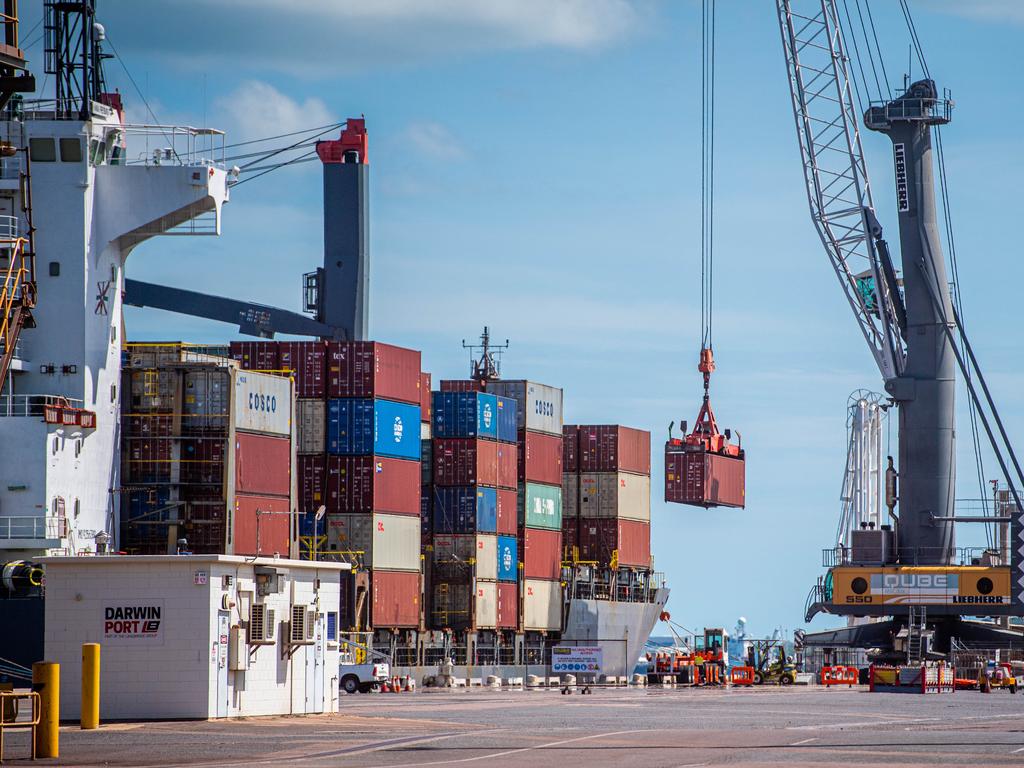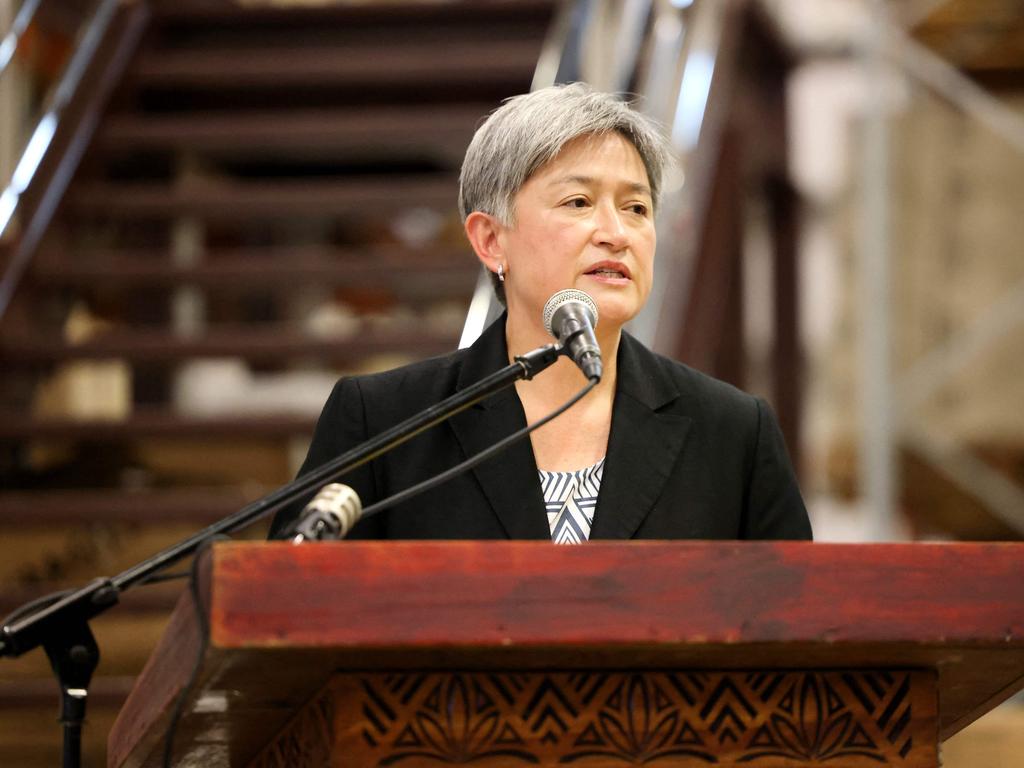Labor must cancel Darwin port lease as part of China strategy


In fact, Labor made no specific election promise to review the Port of Darwin lease. Albanese criticised the previous government’s handling of the lease and said he was part of the Gillard cabinet that “proudly put US Marines in Darwin”.
Prior to the election, on the May 5 ABC program Q+A, Albanese declined to say what Labor would do about the port because of “legal implications”. He said Labor opposed the lease “at the time” in 2015 and “the idea that the Port of Darwin does not have national security and national implications for us is, to my mind, quite obviously absurd”.
Albanese has a brilliant opportunity to reshape Australia’s national security by resuming ownership of the Port of Darwin and greatly expanding its facilities to support a larger defence and allied presence in the north.
A failure to do this will weaken Australia’s capacity to build a stronger deterrent posture, working with the US and Japan, against Beijing’s increasingly aggressive presence to our north and in the Pacific.

The first physical meeting of the Shangri La Dialogue in Singapore on the weekend brought together many defence ministers and regional leaders, most of whom engaged in pointless word games – calling for increased transparency of military planning but seldom mentioning China in the same sentence.
Delivering the keynote speech, Japan’s Prime Minister, Fumio Kishida, was more pessimistic, saying: “I myself have a strong sense of urgency that Ukraine today may be east Asia tomorrow.” Kishida pledged to “fundamentally reinforce Japan’s defence capabilities within the next five years and secure a substantial increase in Japan’s defence budget needed to effect such reinforcement”.
Australia needs to develop the same sense of urgency. Consider the past few months in which Beijing has sent warships along our north, east and west coasts and engaged in dangerous gamesmanship with Australian aircraft over the South China Sea and the Arafura Sea.
At the same time, China concluded a security agreement with Solomon Islands and then faced a diplomatic rebuff when a larger grouping of Pacific Island countries rejected a similar deal.
Beijing rebuked Jacinda Ardern – hardly a security hawk – for the temerity of discussing regional security with Joe Biden. While China’s Defence Minister, Wei Fenghe, delivered the most bellicose speech at Shangri La, saying, “Let me make this clear: if anyone dares to split Taiwan from China, we will not hesitate to fight. We will fight at all costs. We will fight to the very end. This is the only choice for China.”

None of these moves can be taken as signs of a thawing in Australia-China relations, which was the standard media reaction to Defence Minister Richard Marles meeting with Wei. There is no warming in the bilateral relationship. In fact, China under Xi Jinping is becoming openly hostile and is intent on making quick strategic gains in the Indo-Pacific aimed at weakening the position of the US and its key partners.
For its own reasons – perhaps because the strategic problems are so large and so pressing – the Australian national security community seems incapable of acknowledging the threat. Towards the end of 2021, it appears that the Defence Department would not shift from advising the Morrison government that it could see no strategic reason to end the Port of Darwin lease.
Why Defence takes this position is mystifying. It runs against the highly transparent way in which Beijing is strengthening its position throughout Southeast Asia and the Pacific; it ignores the obvious concerns and military planning of the US, which sees northern Australia as critical strategic territory; and it downplays the views of our neighbours.

President Jose Ramos-Horta told The Sydney Morning Herald on May 23: “We in Timor-Leste are worried about how China is so much present in Australian life. Even our neighbours in the Northern Territory … they leased their Darwin port for 100 years to China. Can you imagine if we were to lease the Dili port to the Chinese just for five years? The Australians and Americans would go berserk.”
Ramos-Horta has a point. We can hardly object to PRC port and airport construction in the Indo-Pacific when so much of our own critical infrastructure has been leased or sold to companies under Beijing’s political authority.
This is the context for Albanese’s review of the Port of Darwin lease. If the Prime Minister hands that task to Defence, you will instantly know that Labor has no real plan for change because Defence will not change its stripes on the port. Albanese should instead fold the Port of Darwin review into a bigger plan to assess the posture of the Australian Defence Force. This was part of Labor’s election platform and promises to assess “whether the ADF has the posture and infrastructure to mobilise quickly if required, particularly (facing) immediate challenges in the Indo-Pacific region”.
Importantly, this review is to be independently chaired with a remit to assess “regional circumstances, including Australia’s role in the Indo-Pacific, particularly Northern Australia and North-West Australia”.
Given the deterioration of our strategic outlook, Labor’s force posture review needs to be done urgently. The Australian Strategic Policy Institute’s Michael Shoebridge correctly calls for Australia to consult with the US and Japan on the Port of Darwin, especially around alternate uses that the ADF and our allies and partners might have for the port.
Albanese’s force posture review is an opportunity for policy creativity, focused on strengthening deterrence, increasing allied access and boosting our northern military presence. It goes without saying that China will not welcome an Australian decision to resume control of the Port of Darwin. Then again, China will not welcome any Australian move to strengthen our security.
We should hope that an interest to resume talks with Beijing won’t get in the way of Albanese taking necessary action on Defence in the north. Beijing could well make keeping the lease on Darwin Port its price for talks. That would be the ultimate victory of symbolism over substance. Talk or no talk, no one in Beijing is listening today to calls for transparency and adhering to the rules-based international order







Unexpectedly, Anthony Albanese has announced another review into the 99-year lease of the Port of Darwin by a Chinese company. In Darwin on June 8, he was asked what Labor would do about the lease: “What I’ve said is what I said prior to the election – and I will do what I said I would do on this and every other issue – which is we’ll have a review of the circumstances of the port,” he said.